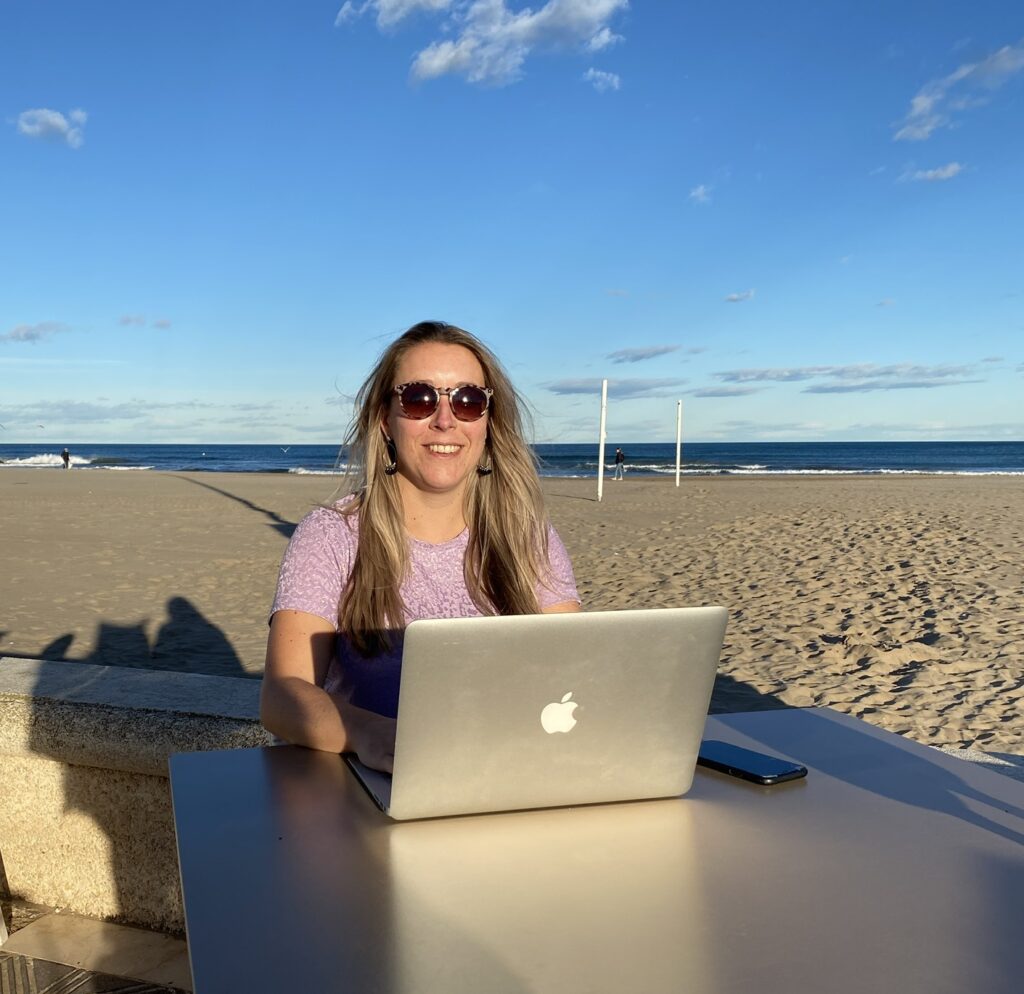It is by no means possible for all jobs to work from abroad. And far from every employer will agree. Fortunately, I do know of examples of both large corporates and SMEs that favor workations. Those companies value freedom and trust, giving employees the flexibility to work from wherever they want. Provided, of course, you meet some preconditions such as good Internet, a good workplace, being accessible and doing your job well. But that is all perfectly feasible.
Development in the labor market
Taking good care of your staff is not new. Companies are becoming better and more open-minded in this area. Covid has accelerated flexible working enormously. And so has the workation trend or working as a digital nomad. There is a shortage of employees. That is why it is even more important what you have to offer as an employer. Giving space and freedom for workations can therefore make a company more attractive. Of course, it must fit your organization and be possible to work remotely.
Because it is still so new, it is not just on a website that this is possible. This is also not the case at my previous employer Frankwatching. An outsider does not really know that this has been very common with us for years. Which is a shame, because I know for sure that this attracts people. So start a conversation with an employer if you want this too. Who knows what is possible or where the conversation will lead.

Starting the conversation with your employer
I regularly speak to people who have gone ‘under the radar’, usually because they don’t feel like dealing with any hassle or getting a wry look from colleagues. A shame, because honesty is a requirement for mutual trust. On the other hand, I sometimes understand someone, because if it doesn’t matter where you work for your job anyway, then you just want to be able to leave. Let it be clear that I am not in favour of going abroad without informing your employer. In some cases, this could even entail the necessary risks, if the company policy does not match your actions.
So start the conversation and indicate what your needs and wishes are. Explain why you want this. Prepare well and make sure you know what to think about when doing a workation. Then you can tell your manager or boss more about it. Maybe that person doesn’t really know what to imagine. Explaining what you want to do is very important to give a good picture of the situation. I will tell you below what you can prepare for that conversation.
Tip #1 – Check the workation rules
Find out if there are already rules for working from abroad. At large organizations, there will be a policy, perhaps even on paper, about your workplace. With SME companies, this may be less concrete, but just right to start the conversation about the possibilities. In this, the company can make a choice to allow it or not.
Tip #2 – Prepare and write it down.
Write down literally what points you want to discuss. It always helps me tremendously to write it down, that way you can be sure you don’t forget anything to say or ask during your interview. In the heat of the moment, that tends to happen. Think about why you want this, what your motivation is. In my case, it was a huge need for new stimuli and positive energy.
Tip #3 – Workation destination and period
Besides your motive, you should also discuss how long you want to go away, what destination you want to go to and where you will stay. That plan doesn’t have to be in the works yet, indeed, you certainly shouldn’t book it in advance, but you should have a plan. Take into account the time difference. Your colleagues will usually work from 9 a.m. to 5 p.m., and in order to communicate with them decently, you will have to work mostly between those times, which is efficient. Nor is it very convenient if you want to leave during the busiest time of the year, in which case taking extra time off is out of the question. Or if you are needed at the office. So plan around that.
Tip #4 – Shaping your work week
Above I mentioned that you need to plan when you can easily be away. In addition, you need to determine how the balance between work and time off will be. I often take an extra day off when I am on workation so that I have just a little more time to do fun things. Or, like me, you can even take a portion of unpaid leave. Discuss this with your employer and colleagues as well. But in principle, of course, this always applies. This will give you a good idea of your work week and then you can start planning your free time and activities.
Tip #5 – Arranging your workation stay
Finally, you need to arrange your accommodation. Not a whole lot different from your vacation accommodation, but there are a few things to consider when working from abroad. Good wifi is almost everywhere these days, but check in reviews to see if it is indeed good quality. Comments like “the wifi dropped out frequently” are a red flag! In addition, I always like to book an apartment or hostel with a nice work desk. Then I don’t always have to go to flex-work places. Although that is also very nice. Finally, I don’t know if it’s necessary to say you shouldn’t sit in the bushbush? Something with no wifi and range at all, nice as a vacation, but not as a workation.

Asking permission at work
To be honest, when I asked if I could work from Spain for 3 (!) months, I was quite nervous. It was actually strange, because I already knew that others also worked from abroad for a longer period of time or even permanently. But still. It is something new and therefore always a bit exciting. But that tension was not necessary, it was a very nice conversation and everything was fine.
I immediately indicated that I had thought about the preconditions such as the workplace and accessibility, which helped.
I was even given the opportunity to temporarily work less, which I really wanted. As a result, I now work 3 days. I can tell you that I am extremely happy with that, 4 days a week to discover Spain. Doing fun things, a nice day at the beach. I am really lucky!
This is what my workation work week looks like
I am an event manager at Frankwatching, a marketing platform. At an event I have to be at the location in Utrecht, but around that I have complete freedom. My workations are usually about a week. I often choose 1 city, otherwise I lose too much time with the journey there and back and I like to take my time somewhere. Those travel days are often in the weekend. During the day I work, usually between 9:00 and 17:00. That is not necessary, but I like the structure it gives me. In addition, I also have quite a few online meetings with colleagues, and most of them work between those times. I see it as a privilege to be able to work from abroad, so I don’t want to ‘bother’ anyone else with meetings at inconvenient times.
During my lunch break I often take a walk, which in Spain is almost always nice in the sun. That way you see something of your surroundings. At the end of the day I close my laptop and go into town or to the sunset on the beach.
After 5 minutes you have already forgotten that you worked that day.
Perhaps you wonder whether it is not too tempting to completely immerse yourself in the holiday atmosphere and lose sight of the balance with work. Yes and no. Yes, that temptation is there, no, my sense of responsibility is too great to be able to neglect it. I want to be able to look myself in the mirror. And besides that, there is also work on the pile that needs to be done.
Tip: Does your employer still know little about workations? Then forward this blog or my previous article on frankwatching.com >
https://www.frankwatching.com/archive/2021/12/03/werken-vanuit-buitenland/
More inspiration on remote working in salaried employment








